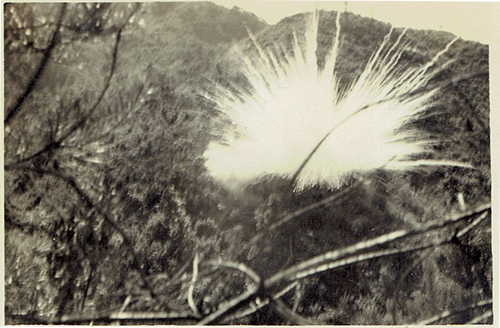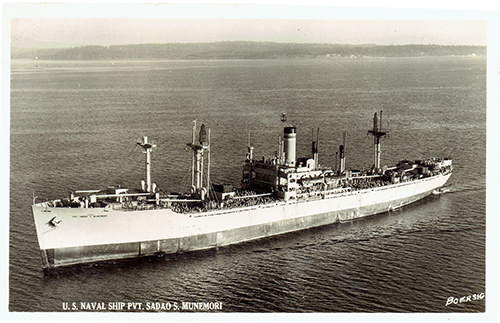- Incoming WP Round
My second day on line in Korea. In lower right hand corner our medic, Doc Carey prepares to go to the bunker near the white phosphorus mortar round.
Welcome to Korea
Chorion Valley, Korea March, 1952
No employable skills, no job, twenty-years-old what is my future? Soon, President Truman determined my future. He continued the WWII draft. Dave and I were swept into its current. On June 25, 1950 the North Koreans invaded South Korea. The draft board sent my good friend Dave Sohmer and myself a notice informing us that we were to report for a physical at 39 Whitehall St. in Manhattan on June 30, 1950.
It was like a James Monroe High School reunion. We reminisced about the fun we had those days, then the pokes and squeezes began. It started with a hemorrhoid check. A doctor with a mirror strapped to his forehead, and a tongue depressor in his hand directed the draftee:
“Bend over and spread you cheeks, until I tell you to let go.”
In a few minutes Fridiholtz, a peculiar character at Monroe stepped up and bent over. As soon as the doctor’s tongue depressor made contact with Fridiholtz’s rectum, he rocketed into to the air.
“Let’s try it again,” said the doctor.
Fridiholtz bent over, looked warily over his shoulder as the tongue depressor approached, again, a vertical ascent.
“Now stand here son,” said the doctor gently, “and watch how the other boys do it.”
That was the opening curtain. Onward we went until the final act.
In four months, I was classified 1A. In sixteen weeks I was trained to be a killer.
With basic training completed, Dave and I were sent by trooptrain to Seattle, WA. The M.S.T.S. Simon Buckner was waiting at the port to bring the troops from Seattle to Yokohama, Japan. Infantrymen were desperately needed.
After a few days in Yokohama, the M.S.T.S. Sadao Munemori brought us to Inchon, Korea. From there, through a rainstorm, a train took us to the 3rd Division, 15th Regt, 3rd battalion headquarters. Viscous puddles of mud greeted our boots as we disembarked. A rotund colonel, squeezed into a poncho like an Italian sausage strode out of a squad tent to greet us. Upon recovering his breath he announced,
“Welcome to the 15th Regt, the MILK Regiment (composed of companies (M, I, L and K) of the Third Division. This is the Can Do Regiment. Instead of saying, “Yes Sir” to an officer, say, “Can Do Sir.” And, if you are especially on the ball, you will say, “Have Done Sir.”
What is this? This can’t be. I don’t believe it. Am I back in junior high school?
We were marched to a trenchline running east to west on the 38th parallel. Sgt. Springer, our platoon leader gave me a BAR (Browning Automatic Rifle), and then introduced me to my roommate, Jesse and my new home, a 6’ x 8’ bunker.
“Where do we sleep Jesse?”
“Spread out your poncho, put your sleeping bag on top of it, and that will be your bed.”
“My bed? At home the springs were popping out of my mattress. My mother put a blanket over them, but this?”
“You’re not in the artillery or the tanks Danny boy, this is the infantry!”
Then he began to sing:
Rocks have been my pillow Cold ground’s been my bed The stars have been my cover And the blue sky’s been my spread.
In spite of the overhead whishes followed by booms in the distance, war to me was still in the movies.
Late in the evening, I was introduced to the real thing. Russel Wirt and I were assigned to guard the Free Lane. It was a pathway free of land mines, so that our men can enter and leave our position without the danger of stepping on a land mine.
After two hours we could hear an exchange of fire in the valley to the front of us. Within ten minutes a squad returned with their wounded. A medic directed the KATUSAS (Koreans Attached to the US Army) to place a litter with a severely wounded man near us. He was squirming like a cut worm. The lower part of his left boot had been blown off, and from his heel gushed blood. The medic gave him a shot of morphine then mixed a tube of sterile water with powdered plasma. The wounded man’s face turned from agony to tranquility.
How will I explain what happened that night to my grandchildren? To my wife? To my children? To my friends? Briefly, it was a nightmare, and I had no idea how Korea would affect my life.
Jesse greeted me in the morning,
“Well, what do you think of Korea?”
Was a reply necessary?
Neither my poncho, nor my sleeping bag were a barrier to the bunker’s cold, damp ground, but once I crept outside I was able to reacquaint my muscles to their bones.
“Where’s the toilet Jesse?”
“Grab you entrenching tool and dig a rut on the reverse slope.”
“Where’s the reverse slope?”
“It’s on the backside of our hill. You don’t want the Chinks to see your shiny white ass, do you?”
“OK. Where’s the toilet paper?
“We don’t know toilet paper.”
Jesse handed me The Stars and Stripes, a US Army newspaper.
“Tear off one page, that’s our toilet paper.”
My entrenching tool left a scar on a slanted area of the hill.
No seat, just squat.
The Yankees were still in Florida for Spring Training.
Eddie Fisher joined the army and is coming to Korea. My dear little father loved him when he sang, Oh My Pappa.
Our flyboys shot down 2 MIGs.
Rumors about peace talks continue.
All done. No more Stars, but plenty of Stripes.
I was a toilet rookie, but in a few days I became a veteran.
Meanwhile, Jesse’s time was up. He was going stateside. I was left alone in our bunker with a wooden box of unreliable British grenades. A direct hit by an incoming mortar round could blow the bunker to bits. I’ll see Sgt. Springer about them.
- Sadao Munemori MSTS.
For the complete story read, Cold Ground’s Been My Bed: A Korean War Memoir by Daniel Wolfe. danielwolfebooks@aol.com

